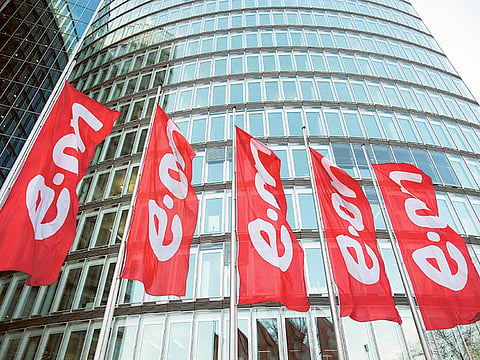EON posts €6b loss after overvaluing fossil fuels spin-off
The write-down contributed to a net loss of €9.3b for the first nine months of the year

Frankfurt: German energy giant EON on Wednesday said it had booked a loss of €6.4 billion (Dh23.5 billion) in the third quarter after massively overvaluing its fossil fuels spin-off Uniper.
Uniper made its debut on the stock market in September where it has been trading at about a third the value estimated by its parent company, resulting in €6.1 billion ($6.7 billion) in impairment charges for EON.
“EON had to adjust Uniper’s book value to reflect its market capitalisation,” the group said in a statement.
The write-down, widely expected by analysts, contributed to a net loss of €9.3 billion for the first nine months of the year, EON added.
EON created Uniper to take over its fossil fuel operations so it could focus on renewable energy as part of Germany’s transition to cleaner forms of electricity generation.
Like other energy firms in the country, EON has been battling to adapt to a new environment of low wholesale electricity prices and competition from government-subsidised renewables.
Since its flotation in Frankfurt, Uniper has been trading at a market capitalisation of around four billion euros, well below the €12-billion book value given to it by EON.
Despite the bad news, the utility confirmed its full-year outlook, saying it expected adjusted earnings before tax and interest of between €2.7 and €3.1 billion, and a net profit of between €600 million to €1 billion.
It also stressed that Uniper’s stock price “has risen by more than 20 per cent since the successful spin-off”.
“This is because the market sees signs of recovery in the conventional energy world,” EON said.
Fukushima disaster
As part of Germany’s shifting energy focus, EON has also felt the pinch from the government’s decision to turn away from nuclear power following the 2011 Fukushima disaster.
EON warned that the costs related to the nuclear energy phase-out would have “an additional adverse impact”.
EON expects it will have to contribute some €10 billion to a fund dedicated to paying for nuclear waste storage as part of the exit from atomic power.
But chief financial officer Michael Sen said EON had “sufficient financing flexibility to make available the necessary funds”, as he sought to downplay investor concerns the group may have to raise capital to pay for its share of managing the nuclear waste.
“There’s therefore no need for us to take action in the immediate future,” he said. “We’re aiming to avoid a rights issue.”
EON shares were down by 1.3 per cent to €6.33 in early morning trading in Frankfurt.



